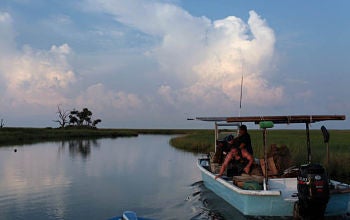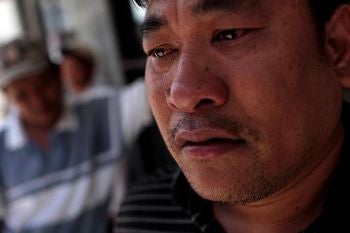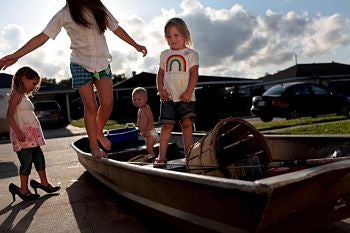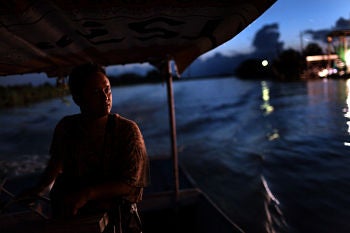
Photographer Melanie Burford is interested in a facet of the BP oil spill that often receives less photographic attention: how the damage to ecosystems has plagued the lives of the people that depend on the Gulf’s habitat for their livelihood.
Burford, who with colleagues at the Dallas Morning News won the 2006 Pulitzer Prize for their photography coverage of Katrina, recently returned to fishing communities she visited in the aftermath of the hurricane. On assignment for the photo agency Corbis, Burford went to Delacroix Island to document the daily lives of the fishermen before the oil shut down the entire fishing industry. “Some days I went out on the boats with the fishermen and barely took any photos because I was just listening to what they had to say,” she says. After returning from the Gulf, Burford, now an adjunct professor at Columbia Journalism School, reflected on how the spill is affecting fishermen and their concerns that a way of life may be lost to future generations.
How important is the fishing industry on Delacroix Island?
In one way or another the area’s entire economy comes from fishing. There are three main fishing industries: oyster, shrimp, and blue crab. Oyster and shrimp have been completely shut down, but the blue crab is found in water that has not been polluted. A couple weeks ago though the market for blue crab completely crashed because nobody wants to buy what they think is contaminated crab, even though it’s not contaminated at all. So incomes have been cut in half. And for the shrimpers, now is high season, now is when they earn all the money to last them through the winter, and obviously they are earning nothing.
 Photo courtesy of Melanie Burford/Corbis
Photo courtesy of Melanie Burford/Corbis
Crab fishermen head out at dawn down the canal leading into the bayou. Local fisherman from St Bernard Parish were desperately fishing the surrounding bayou to earn as much income as possible before authorities shut down the crab fishing while the BP oil spill inched closer.
Is the government or BP doing anything to supplement the fishermen’s lost income?
From the government there are supplemental checks for the deck hands and the boat captains but that money is not going to cut it for families with no incomes. As for BP, they are now hiring fishermen to lay out absorbent boom. It’s sort of like a tissue paper that absorbs the oil. They are putting out miles and miles of this stuff. On the one hand it’s good for the fishermen because it’s replacing lost income, but it’s only on a four day rotation. You can only do it for four days and then it becomes someone else’s turn. Also there are a lot of fishermen that don’t want to earn their living from BP. But most have children and families to support so they are backed into a corner. They don’t want to be around the chemicals either. I personally believe that the dispersants being sprayed on the oil may end up being as damaging as the oil itself.
How are fishermen responding to the spill?
Already, there have been many lives turned upside down. People are completely losing their incomes, their livelihood. There is a lot of fear. The scariest part is that everything is unknown. There is anger, frustration, depression, every emotion you can imagine. They are afraid of losing their heritage. We’re talking about the loss of a way of life; it is historical. One thing that most people aren’t grasping is that it’s not about the money with these guys. I attended a meeting with community members, BP, and the coast guard, and the residents and fishermen didn’t even really mention money. It’s about their way of life, their children, and their childrens’ children, and what’s going to happen to the land. There aren’t many communities anywhere that live off of the land like these people do and so they cherish the land in a way that few people do. Being out on the water is the reason they get up in the morning. These guys go out at 5 a.m. every morning and it’s the most beautiful sight, to watch that sunrise while they are working on the water. It’s hard to watch somebody who’s so passionate lose what they love. I mean if someone took away my camera and said I’m sorry you can’t take photos anymore for a whole bunch of years, I don’t know how I’d react. One guy told me through tears, ‘This is not a joke. This is my life.’
 Photo courtesy of Melanie Burford/Corbis
Shrimpboat captain Minh Vo cries after waiting for over four hours for financial support from Catholic Charities in New Orleans East, LA. May 21, 2010. He received a $100 grocery check for his family of six. His wife was forced to find a job after his commercial shrimp boat was grounded because of the oil spill.
Photo courtesy of Melanie Burford/Corbis
Shrimpboat captain Minh Vo cries after waiting for over four hours for financial support from Catholic Charities in New Orleans East, LA. May 21, 2010. He received a $100 grocery check for his family of six. His wife was forced to find a job after his commercial shrimp boat was grounded because of the oil spill.
What does the future hold for him and other fishermen?
Nobody knows. But the oil is going to come here eventually and the fact that it is hurricane season makes it scarier. If currents change that could make everything worse. I also fear that the fishermen who have been and will be forced to go work for BP are going to get sick. I’m really worried for these guys.
 Photo courtesy of Melanie Burford/Corbis
Sisters Gabbrielle Melerine, 4, left, Hailey Melerine, 7, Jason Melerine Jr., 2, and Hannah Melerine, 3, center, play on one of their father Jason Melerine's fishing boats in Poydras, St Bernard Parish, LA
Do you have any plans to go back?
Photo courtesy of Melanie Burford/Corbis
Sisters Gabbrielle Melerine, 4, left, Hailey Melerine, 7, Jason Melerine Jr., 2, and Hannah Melerine, 3, center, play on one of their father Jason Melerine's fishing boats in Poydras, St Bernard Parish, LA
Do you have any plans to go back? Yeah, I am going back in July to live down there for a while. When I do I will shift gears slightly and take photos that show the bigger picture, the oil, the wildlife, and how the spill is affecting not just the people but every species that’s living there.
You saw these people rebuild after the devastation of Katrina. How does the spill compare to what happened then?
There is a huge difference between this and Katrina. This is not like Katrina for them. Katrina, they lost their homes, they lost their boats, but many of them got some amount of insurance and eventually rebuilt what was lost. It took time but they could go back out and start fishing again. The lost income was replaceable. With the oil spill, they have no control and nobody knows the length of time that they are going to be affected. One fisherman told me of a nightmare that he had, in which he was reliving Katrina. He started to drown; only he was not drowning in water. He was drowning in oil.
 Photo courtesy of Melanie Burford/Corbis
Photo courtesy of Melanie Burford/Corbis
Click here to see Burford's work as it appears on the corbis blog and here to see the full collection of photos. A story about her work also appears on the New York Times Lens Blog.






